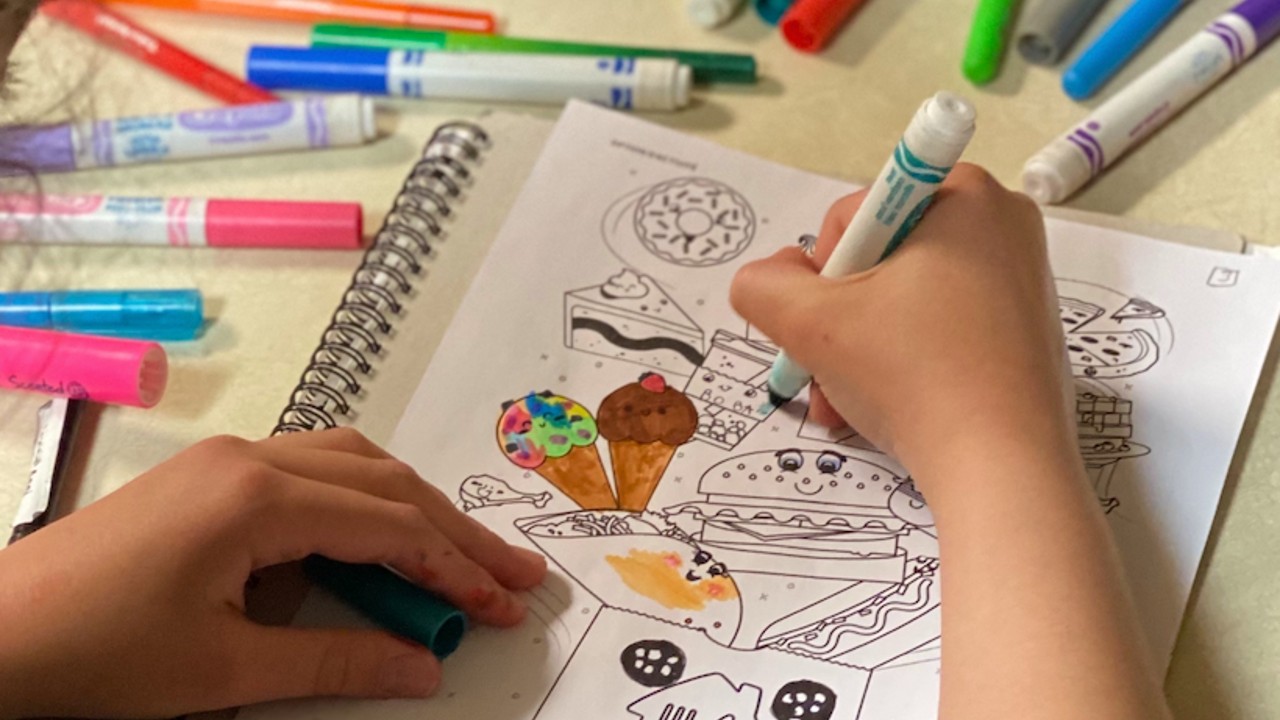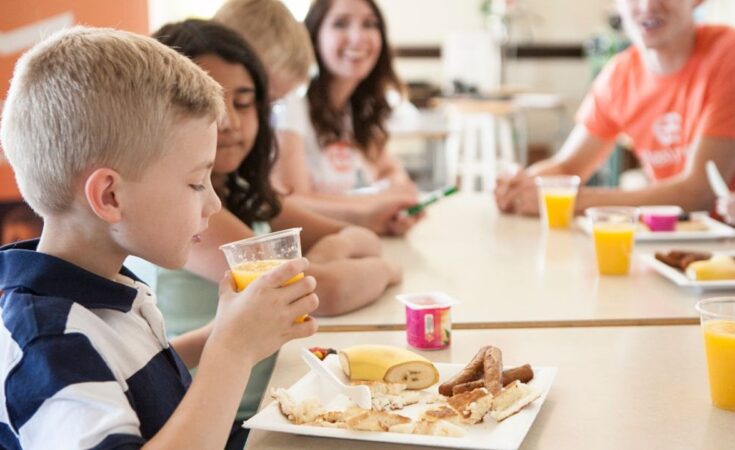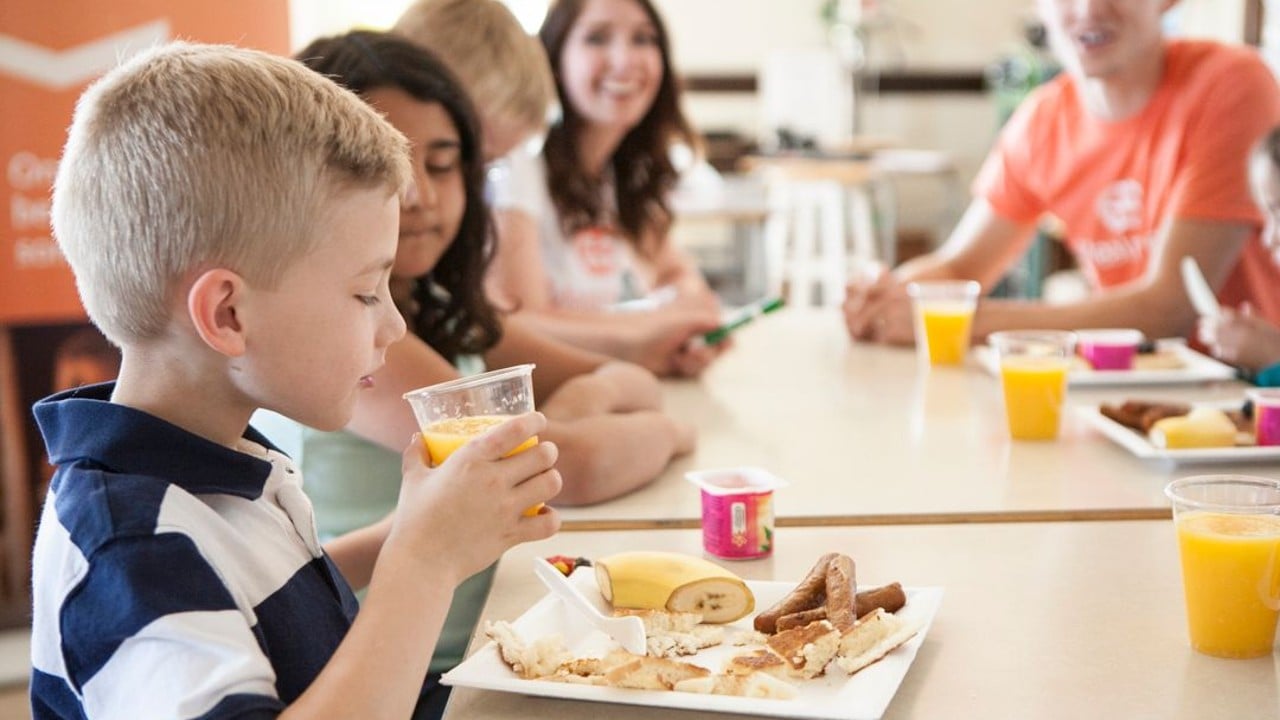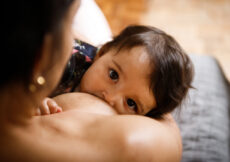With colouring pages, thought starters and crafts, the Food for Thought ultimate activity book helps kids give back to those in need.
A staggering one million children in Canada go to bed every night with empty tummies. That’s one in five kids who are food insecure, meaning that nutritious, sufficient amounts of food are unavailable or inaccessible, interrupting kids’ ability to grow, learn and develop at the average rate. The COVID-19 pandemic, along with rapidly rising inflation and food prices, has accelerated the problem.
“Food insecurity continues to be an important issue both across the world, and unfortunately here at home in Canada, affecting families, and especially children in need,” says Breanne Sich, Vice President of Marketing at Mealshare, a Canadian social enterprise focused on helping to end youth hunger.
On World Hunger Day on May 28, Mealshare is teaming up with SkipTheDishes, the largest food delivery network in Canada, for their second annual Food for Thought campaign. The initiative helps bring meals to children and their families in need. Sich says that the campaign is vital to sparking conversations with kids and encouraging them to learn about food scarcity and about how they can help make a difference.
Families can help out by downloading the Food For Thought ultimate activity package and completing educational and engaging activities, which include design-your-own garden, draw-your-dinner-plate, and colouring pages. These activities encourage kids to learn about important issues in a fun and engaging way. Once kids complete the activities, parents and educators can simply submit their work online through the Mealshare website. For each completed activity, Skip will donate five meals to children in need, on top of their $25,000 donation to Mealshare. Parents and educators can submit completed activity pages until June 10. Plus, for every child who completes and returns one of these activities, the teacher or guardian will also be entered to win 1 of 13 $200 SkipTheDishes gift cards!

How to talk to kids about food insecurity
Talking about hunger and its root causes are important first steps to building awareness and driving real social change. But how do we talk to kids about hunger? Start with the basics, keep it simple and use the talking points in the Food For Thought resource package to spark conversations at home. You can download it at mealshare.ca/foodforfhought.
Ask kids if they know what food insecurity is and explain it in simple terms. It means living without reliable access to enough food that’s affordable, nutritious, and culturally appropriate. Share that there are a lot of kids in Canada who often miss meals and feel hungry. Kids may not notice this about their friends, but if they do, they should tell a grown-up.
You can also get practical by visiting the grocery store with your kids and teaching some lessons about food availability, the cost of food, access to food, and budgeting. While you’re there, discuss the differences in price and nutritional value of cheap, processed food, and healthy, fresh produce. These issues are the precursors to later, deeper discussions with tweens and teens around food justice.
Need help continuing the conversation? Try these great books about food insecurity for kids:
- Maddi’s Fridge by Lois Brandt
- One Potato, Two Potato by Cynthia C. DeFelice
- Uncle Willie and the Soup Kitchen by DyAnne DiSalvo-Ryan
- The Lunch Thief by Anne C. Bromley, Robert Casilla
- On Our Street: Our First Talk about Poverty by Jillian Roberts, Jaime Casap
For more information, visit mealshare.ca/foodforthought.
Stay in touch
Subscribe to Today’s Parent’s daily newsletter for our best parenting news, tips, essays and recipes.
= 0;if(!is_postback){return;}var form_content = jQuery(this).contents().find(‘#gform_wrapper_13’);var is_confirmation = jQuery(this).contents().find(‘#gform_confirmation_wrapper_13’).length > 0;var is_redirect = contents.indexOf(‘gformRedirect(){‘) >= 0;var is_form = form_content.length > 0 && ! is_redirect && ! is_confirmation;var mt = parseInt(jQuery(‘html’).css(‘margin-top’), 10) + parseInt(jQuery(‘body’).css(‘margin-top’), 10) + 100;if(is_form){jQuery(‘#gform_wrapper_13’).html(form_content.html());if(form_content.hasClass(‘gform_validation_error’)){jQuery(‘#gform_wrapper_13’).addClass(‘gform_validation_error’);} else {jQuery(‘#gform_wrapper_13’).removeClass(‘gform_validation_error’);}setTimeout( function() { /* delay the scroll by 50 milliseconds to fix a bug in chrome */ jQuery(document).scrollTop(jQuery(‘#gform_wrapper_13’).offset().top – mt); }, 50 );if(window[‘gformInitDatepicker’]) {gformInitDatepicker();}if(window[‘gformInitPriceFields’]) {gformInitPriceFields();}var current_page = jQuery(‘#gform_source_page_number_13’).val();gformInitSpinner( 13, ‘https://www.todaysparent.com/wp-content/plugins/gravityforms/images/spinner.gif’ );jQuery(document).trigger(‘gform_page_loaded’, [13, current_page]);window[‘gf_submitting_13’] = false;}else if(!is_redirect){var confirmation_content = jQuery(this).contents().find(‘.GF_AJAX_POSTBACK’).html();if(!confirmation_content){confirmation_content = contents;}setTimeout(function(){jQuery(‘#gform_wrapper_13’).replaceWith(confirmation_content);jQuery(document).scrollTop(jQuery(‘#gf_13’).offset().top – mt);jQuery(document).trigger(‘gform_confirmation_loaded’, [13]);window[‘gf_submitting_13’] = false;}, 50);}else{jQuery(‘#gform_13’).append(contents);if(window[‘gformRedirect’]) {gformRedirect();}}jQuery(document).trigger(‘gform_post_render’, [13, current_page]);} );} );]]>
Read The Full Article Here




































